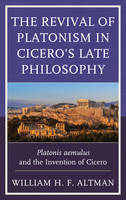The Revival of Platonism in Cicero's Late Philosophy: Platonis aemulus and the Invention of CiceroAuthor :
Hardback
Published : Wednesday 13 April 2016
You may also like ...

by
Hardback
04 Oct 2012
>>
€116.89
Extended stock - Dispatch 5-7 days

by
Hardback
15 Mar 2016
>>
€128.94
Extended stock - Dispatch 5-7 days

by
Hardback
13 Apr 2016
>>
€107.25
Extended stock - Dispatch 5-7 days
Description
This book argues that Cicero deserves to be spoken of with more respect and to be studied with greater care. Using Plato's influence on Cicero's life and writings as a clue, Altman reveals the ineffable combination of qualities that enabled Cicero not only to revive Platonism, but also to rival Plato himself.
Less than two years before his murder, Cicero created a catalogue of his philosophical writings that included dialogues he had written years before, numerous recently completed works, and even one he had not yet begun to write, all arranged in the order he intended them to be read, beginning with the introductory Hortensius, rather than in accordance with order of composition. Following the order of the De divinatione catalogue, William H. F. Altman considers each of Cicero's late works as part of a coherent philosophical project determined throughout by its author's Platonism. Locating the parallel between Plato's Allegory of the Cave and Cicero's Dream of Scipio at the center of Cicero's life and thought as both philosopher and orator, Altman argues that Cicero is not only Plato's rival (it was Quintilian who called him Platonis aemulus) but also a peerless guide to what it means to be a Platonist, especially since Plato's legacy was as hotly debated in his own time as it still is in ours. Distinctive of Cicero's late dialogues is the invention of a character named Cicero, an amiable if incompetent adherent of the New Academy whose primary concern is only with what is truth-like (veri simile). Following Augustine's lead, Altman reveals the deliberate inadequacy of this pose and argues that Cicero himself, the writer of dialogues who used Cicero as one of many philosophical personae, must always be sought elsewhere: in direct dialogue with the dialogues of Plato, the teacher he revered and whose Platonism he revived. The Revival of Platonism in Cicero's Late Philosophy: Platonis aemulus and the Invention of Cicero is a must read for anyone working in classical studies, ancient philosophy, ancient history, or the history of philosophy.
Reviews